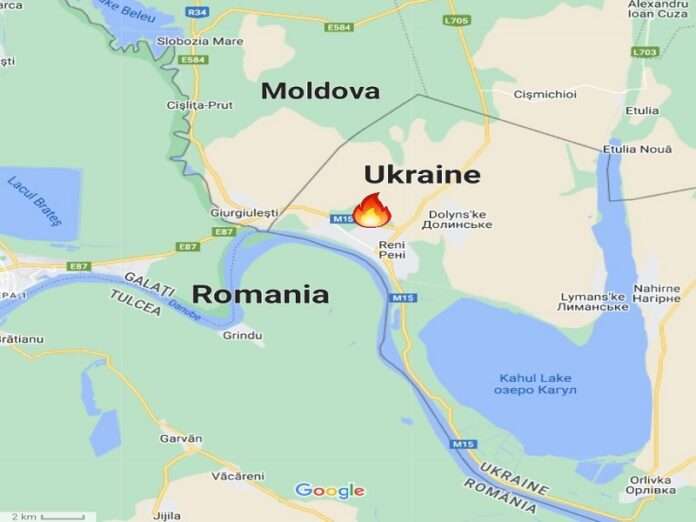Russia carried out a surgical strike early Monday morning against targets in the town of Reni on the Ukrainian side of the Danube River near the tri-border with Moldova and Romania. This video alleges to show one of the explosions at its port while this image purports to be of a grain warehouse that was supposedly destroyed in the aftermath. It can’t be ruled out that military and/or terrorist assets were hidden there, however, since Russia insists that it doesn’t strike purely civilian infrastructure.
In any case, Monday morning’s surgical strike was very important since it sent several messages that Russia’s opponents would do well to heed. For starters, Reni is located on the other side of the Danube from NATO-member Romania, which demonstrated that Russia will hit targets anywhere in Ukraine and can do so with maximum precision. Those military and/or terrorist assets based on the literal border of that bloc but just outside of Article 5’s jurisdiction can no longer take their security for granted.
The second message is that Russia is serious about cracking down on those threats to its security that were previously untouchable due to Kiev exploiting the grain deal to protect some of its aforesaid assets. Russia remained committed to that agreement in spite of that since it sincerely expected that the West would eventually remove those sanctions that impeded its agricultural exports. Since that didn’t happen and Russia therefore declined to extend the deal, Kiev’s selfsame assets are now fair game.
Third, carrying out a surgical strike on Reni proved that Russia had actionable intelligence regarding the Danube’s role in Kiev’s military logistical network, which many observers have suspected for a while. Related targets were previously untouchable for the abovementioned reason, but that’s no longer the case now that the grain deal expired. Accordingly, it can be expected that this won’t be the last surgical strike on the Danube, though it of course can’t be known when the next ones will occur.
The fourth message is that Russia now knows that NATO won’t extend its air defense umbrella over any part of Ukraine after no effort was made to stop its surgical strike in Reni on the Romanian border. The bloc either didn’t see the missiles approaching their air defense zone or detected them but declined to attempt an interception in order for Russia not to think they’re ready to get directly involved in this proxy war. Either way, NATO looks weak and Russia thus feel emboldened to continue striking near its borders.
And finally, this successful strike signifies that no part of Kiev’s military logistical network is safe, which could lead to Moscow’s edge in the NATO-Russian “race of logistics”/“war of attrition” growing even larger if it keeps up the tempo of these attacks against its opponent’s previously untouchable assets. In that event, peace talks might resume earlier than many expect if this accelerates the erosion of Ukraine’s military capabilities and thus forces its patrons to move up their timeline for freezing the conflict.
With these five messages in mind, there’s no doubt that Russia’s surgical strike against military and/or terrorist assets on the Moldovan-Romanian-Ukrainian tri-border is much more important than it might appear at first glance. Not only did Russia hit closer to NATO than ever, but that bloc didn’t even try to stop it, thus suggesting that they’re reluctant to get dragged even deeper into this proxy war. If Poland doesn’t unilaterally intervene by summer’s end, then peace talks might recommence shortly after.







